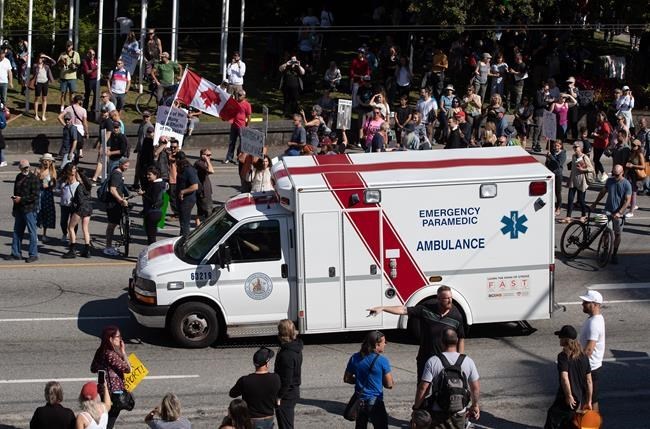Some doctors and nurses are frustrated with large groups of anti-vaccination protesters outside hospitals in cities across the country and say limited health-care resources are being used to save the lives of those who decided not to protect themselves against COVID-19.
Dr. Steven Fedder, who works in the emergency room of a hospital in Richmond, B.C., said he has run out of patience for people whose stance against vaccines has larger societal implications.
"I think it's the ultimate selfishness that individuals choose not to vaccinate themselves. And I think they don't realize they are too arrogant to understand that we live in a society where we all have to make sacrifices," he said.
It's time that more employers, including all levels of governments, started mandating vaccines to send a strong message to those ignoring the science behind vaccination, Fedder said, adding the potential of losing a job may be the jolt people need to get immunized.
Patients suffering from other serious illnesses are affected when the health-care system starts to "grind to a halt" from the number of unvaccinated patients being hospitalized and occupying intensive care beds, Fedder said, noting people with chronic conditions often avoid going to emergency departments when cases spike, sometimes worsening their health.
"For the staff, it's exhausting. It's challenging when you have somebody come in who is there when there was a simple route to preventing what they came in with — a COVID infection. Our job is to be professional and not to be judgmental, but it's very trying for nurses and doctors and all the other health-care professionals to look at somebody who made a conscious decision not to get vaccinated."
Anti-vaccination sentiments have intensified since some provinces announced plans to require so-called vaccination passports to access places like restaurants, movie theatres and gyms. Quebec and Ontario began their programs this week and British Columbia residents will be expected to provide proof of vaccination in the coming weeks.
Over a dozen hospitals in Ontario have issued vaccine mandates for health-care staff. British Columbia's provincial health officer, Dr. Bonnie Henry, has said the province is considering plans for a similar policy at acute-care settings. B.C. has already announced that staff at long-term care facilities will need to be fully vaccinated by mid-October.
Dr. Amit Arya, a palliative care physician at Kensington Health in Toronto, said rallies outside health-care facilities have been emotionally draining for him and other physicians who are burnt out from working long hours.
He denounced a group of protesters outside the University Health Network earlier this week, and said they were disrupting patients and staff from entering the hospital.
“It's really hard to grasp why any group of people would be protesting outside of hospitals, where we have vulnerable people coming in to seek medical care," said Arya, adding he has endured several months of online harassment and hate mail because of his pro-vaccine stance.
“I think people are getting really aggressive about the vaccine issue and I’m scared. I'm scared for my family, I have little children as well and I know many other colleagues in the same sort of boat as me have faced a lot of pushback.”
Vancouver police Const. Tania Visintin said a crowd of about 5,000 people rallied outside Vancouver General Hospital on Wednesday. The protests coincided with others at health-care facilities elsewhere in the province, prompting Premier John Horgan to say the targeting and harassment of health-care workers was "completely unacceptable."
On Friday, the Canadian Medical Association and the Ontario Medical Association issued a joint statement, saying health-care workers have exposed themselves to risks during the pandemic to serve others.
"Unfortunately, anti-vaccine messaging has escalated in recent weeks; and, in certain cities and communities, we are seeing mounting protest which is precluding access to much needed health-care settings and demoralizing health-care workers," it says.
"The health-care workers who have worked tirelessly for months on end are being bullied and harassed for doing their jobs. This is wrong and unacceptable – full stop. We are in a health crisis of unprecedented proportion."
Both the Canadian Medical Association and the Canadian Nurses Association support mandatory COVID-19 vaccinations for health-care workers as a way to protect their front-line staff and patients as well as communities, especially as cases climb around the country.
Michael Villeneuve, CEO of the nurses association, said a very small but vocal percentage of nurses, perhaps three per cent, appear to be against vaccination, especially as a condition of employment, but everyone in the profession should know COVID-19 vaccines have been rigorously tested.
"We base our decisions on science. Nursing as a science is not a collection of opinions. If we adapted care based on what (my) opinion is today versus someone else's, it would be complete chaos out there."
However, Villeneuve, a registered nurse, said it's not always clear that those protesting against vaccines and claiming to be nurses on social media in particular are actually part of the profession.
He said a national response to the public health emergency is needed instead of a patchwork of policies on vaccination in various jurisdictions, which has led to confusion.
"The frustration is, how do you bring people to see the value of the solution," he said of vaccines. "There are always people who say it's a rights-based response, with no responsibility."
— With files from Rhythm Sachdeva in Toronto.
This report by The Canadian Press was first published Sept. 3, 2021.
Camille Bains, The Canadian Press



